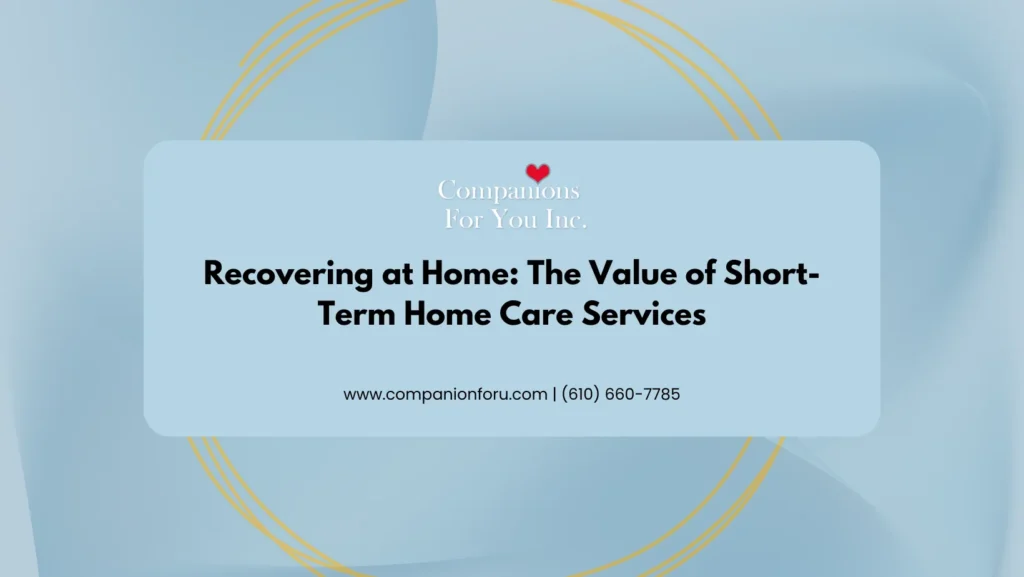Short-Term Care at a Glance
- For Recovery: It provides a safe, professional bridge between the hospital and full independence, reducing the risk of readmission. This is often called Post-Hospital Care.
- For Caregivers: It offers a vital, temporary break for family caregivers to rest and recharge, preventing burnout. This is known as Respite Care.
- The Goal: To provide temporary, flexible support during a specific season of life.
Recovering at Home: The Value of Short-Term Home Care Services
The call from the hospital brings a wave of relief: your mother is being discharged. She’s through the worst of her surgery, and all she wants is to be back in her own comfortable bed in Bala Cynwyd. At the same time, another feeling creeps in: anxiety. How will she manage the stairs? Will she remember her new medications? You have a demanding job and can’t be there 24/7. Similarly, maybe you’re the one providing that 24/7 care for your spouse, and you’ve been doing it for years. You’re exhausted, and with a family wedding approaching, the thought of leaving him even for a weekend feels impossible.
These two scenarios, one of sudden recovery and one of prolonged caregiving, share a common thread: the need for temporary, professional support. This is where short-term home care services provide their incredible value. It’s a solution designed not for a lifetime, but for a specific season of life. Whether it’s providing a bridge to recovery or offering a lifeline to a weary caregiver, these services are built on a foundation of flexibility, compassion, and expertise.
Understanding the “Short-Term” in Home Care
When people hear “home care,” they often think of a long-term arrangement for ongoing conditions. However, many of life’s biggest challenges are temporary. Short-term home care services are designed specifically for these situations. Unlike a permanent placement in one of the local nursing facilities, this type of support is goal-oriented and lasts for a defined period, from a few days to several weeks or months.
This flexible model generally serves two primary purposes:
- Transitional Care: Helping an individual recover safely at home after a hospital stay, surgery, or rehabilitation.
- Caregiver Relief: Providing professional support so a primary family caregiver can take a much-needed break.
Let’s explore the value that each of these provides for families in our community.
How Does Short-Term Care Help After a Hospital Stay?
The first 24 to 72 hours after a hospital discharge are a critical and vulnerable time. A patient may feel weak, be in pain, and have a complex new medication schedule. This is when the risk of falls, medication errors, and hospital readmission is at its highest. Professional Post-Hospital Care is designed to bridge this gap, creating a safe environment for healing.
Instead of worrying about your loved one being alone, a professional caregiver can be there to provide:
- Mobility Support: Assisting with moving around the house, getting in and out of bed, and reducing the risk of falls.
- Medication Reminders: Ensuring the correct medications are taken at the correct times, as prescribed.
- Nutritional Support: Aiding with healthy Meal Planning & Preparation to give the body the fuel it needs to recover.
- Personal Assistance: Offering dignified help with bathing, dressing, and other personal tasks that may be difficult after surgery.
Beyond the physical tasks, the value of Companionship during recovery cannot be overstated. The presence of a friendly, reassuring professional can prevent feelings of isolation and post-operative depression, fostering a positive mindset that is essential for healing.
Value #2: An Essential Lifeline for Family Caregivers
Being a full-time family caregiver is a role born of love, but it can lead to profound exhaustion and burnout. You can’t pour from an empty cup. This is why respite care for caregivers is not a luxury; it is an absolute necessity for sustainable, long-term care. This type of support, often called respite care, provides the break you need to rest, recharge, and take care of your own life.
Whether you need to travel, attend an event, or simply have a weekend to yourself, in home respite care allows your loved one to receive professional support in the familiar comfort of their own home. A professional respite care provider steps in, seamlessly continuing the routines you’ve established. This provides respite services that give you total peace of mind, knowing your loved one is safe and well-cared for.
What Does a Respite Care Provider Actually Do?
The goal of respite care for elderly individuals is to maintain normalcy and routine. A caregiver can provide a wide range of home care services to ensure every need is met. These duties often include:
- Dignified Personal Care: Assisting with bathing, grooming, and dressing.
- Meal Preparation: Cooking nutritious and enjoyable meals according to dietary needs.
- Medication Reminders: Keeping them on track with their prescribed medication schedule.
- Light Housekeeping: Tidying up living spaces to maintain a clean and safe environment.
- Transportation and Errands: Providing Transportation Services for appointments or handling grocery shopping through Errand Services.
- Engaging Companionship: Interacting through conversation, games, or hobbies to keep them socially engaged.
These comprehensive respite care programs ensure that your break is truly restful, without the need to worry about any aspect of your loved one’s care.
Alt Text: A caregiver providing short-term home care services for a senior in Bala Cynwyd, PA.
Planning for Short-Term Care in Bala Cynwyd
One of the best ways to reduce stress is to plan ahead. If your loved one has a scheduled surgery, you can arrange for post-hospital care before they are even admitted. For caregivers, planning respite care for seniors in advance of a known trip or even scheduling regular, weekly breaks can be a powerful tool against burnout.
It’s also wise to understand the payment options available. While many families use Private Pay Home Care, some situations may be covered by Long-Term Care Insurance or specialized programs like Veterans Care Services. Investigating these avenues ahead of time can make the process much smoother.
Support for Every Season
Ultimately, the greatest value of short-term home care services is their flexibility. They provide the right amount of support at precisely the right time. Whether ensuring a safe recovery or providing a much-needed break for a dedicated caregiver, these services provide the peace of mind that allows families in Bala Cynwyd to navigate life’s challenges with confidence and grace.
They are a testament to the fact that asking for help is a sign of strength.
Questions Bala Cynwyd Families Ask
1. How long does short-term home care typically last? The duration is completely flexible. Post-hospital care might last for a few weeks, while respite care could be for a single weekend or a recurring weekly appointment. The plan is always tailored to your specific needs.
2. My mom needs a break from caring for my dad. Is our home considered a “respite home”? Yes, in this context. A “respite home” simply means the place where the care is provided. With in home respite care, your own house becomes the comfortable and familiar setting for our caregiver to step in.
3. How do we start the process for respite care for caregivers in Bala Cynwyd? Simply contact our agency for a consultation. We’ll discuss your loved one’s needs and your schedule to create a seamless plan that gives you the break you deserve.
If you are facing a planned surgery or are feeling the strain of caregiving, we invite you to contact us to learn more about how our tailored services can support you.

